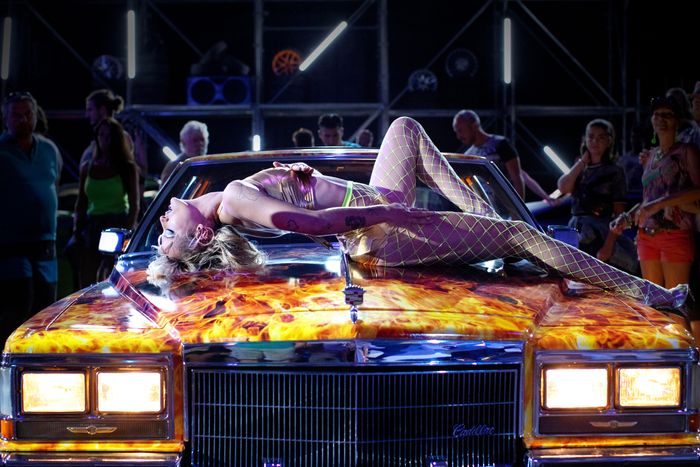Alexia’s (Agathe Rousselle) demeanor is as cold as the titanium plate implanted in her skull. On the receiving end of an unfortunate car accident, while her father (Bertrand Bonello) was driving when she was young (played by Adèle Guigue), Alexia’s cold, piercing stare on a hospital table permeates in her familial relationship. Director/writer Julia Ducournau’s Titane first seeks to cut you like a sharpened blade — reminiscent of the metal hairpin Alexa uses during her murders. Showing it’s had very much like a body horror-infused slasher to start. It lavishes in its visceral sufficiency, shocking fantastical imagery, and even some humor. But as you peel back the layers of the film, there’s almost a gentle side to it. A sudden perspective shift occurs, and while the horror serves as a through-line, it becomes a mediation of human connection and gender fluidity.
Older Alexia dawning a gnarly scar from her surgery becomes a dancer at a motor show. She has her share of admirers asking for autographs, including a girl named Justine (Garance Marillier). In a crazy turn of events shot with a dreamlike coating, Alexia returns to the showroom and has a sexual experience with the car she danced on earlier. At the beginning of the film, her younger self gives a giant hug to her parents’ car before going to the present day. Ducournau weaves this type of juxtaposition that manifests itself again and again throughout the run time. An early cause of Alexia’s pain becomes a tool of euphoric satisfaction. Like the hairpin, she uses to kill her victims brutally (both showed through a news bulletin and on-screen), metal is a traumatic and liberating bond.
Alexia can’t seem to level with any instance of human emotion. The few interactions with her parents are met with heavy silence and apathy—scenes of her walking down a street display a robotic-like sense of tunnel vision. During a killing spree, Ducournau invokes a bit of a laugh when Alexia displays a sarcastic sigh when she has to keep killing people at a party. Not choosing to adhere to a traditional three-act structure, the film’s first half is like a hungry serial killer who also has a car fetish. Alexia’s character is searching for something inside the detached person she’s become.
But then Titane takes a dramatic shift in pacing after Alexa is on the run for murder. She sees a notice for a missing child named Adrien and alters her appearance to fit the description. There, she meets a man named Vincent (Vincent Lindon), a fire captain who instantly embraces her as his son, who has been missing for ten long years. The horrific elements rear their heads constantly. Alexia becomes pregnant. That realization comes with a litany of changes – to motor oil leaking from her breasts and between her legs. Alexia has to result in bandaging to hide this, but it is one way Alexia experiences a metamorphosis into Adrien.
Transformation is one theme that Ducournau dives into. Vincent becomes a caretaker, albeit overbearing, but is determined not to allow his ‘son’ to leave again. Outside his hardened and macho personality, there’s a man who longs to have something to care for. While Alexia was herself, she was bold and acted without consequences. As Adrien, she has to be mute and diminutive, not to blow her cover. However, that allows her to be vulnerable for the first time in her life—an act of surrender like bearing a child. Vincent becomes the father she’s never had, especially when she needs someone the most. Most of the men in Titane only view Alexia as a means of sexual completion, like an overzealous fan she kills at the beginning or complete apathy like her father.
Ducournau and cinematographer Ruben Impens are conscious of the use of color in certain parts of Titane. When Vincent uses steroids and peers into the mirror at this reflection, there’s a pink tint. The exact hue is also present when the firefighters gather to mosh and dance with each other. It’s a device that shows the meeting between the masculine and feminine. Alexia’s mere presence within the troop also infiltrates the testosterone-filled clubhouse at both a micro and macro level. Fire is a powerful tool, both on the car that Alexia dances on and gets involved with, the one that engulfed her parents’ house, as a mode of cleansing and revival.
Vincent’s character is constantly trying to fight off the detriments of aging while holding onto this fleeting instance of physical power. Chalk it up to both his profession and the pathos of man, but he grows immune to them. The ACE bandaging that Alexia uses leaves her body plentiful with scars and wounds. Both characters are a visual mirror image of life’s lashes and jagged, off-kilter pieces of a puzzle that completes each other.
Lindon’s performance serves as the emotional orbit of the film that everything else builds off once his character is introduced. Titane could have just completely invested in the violence and shock of its first part – but elected to become something more. Vincent and Alexia are not without their flaws, and one could question Vincent’s blind devotion. Alexia is just cos-playing someone that Vincent hopes his missing son has grown into. But metal is something that you can shape. Something that you can mold. While some things may get lost in translation, Ducournau fully embraces her crucible of ideas into a work that’s unforgettable in a wide range of senses. Alexia and Vincent are two human personifications of paint that run in together from each part of Titane. It can get messy. Some parts don’t mix all the way, but it’s a work of art.
Photo Credit: Neon Pictures













